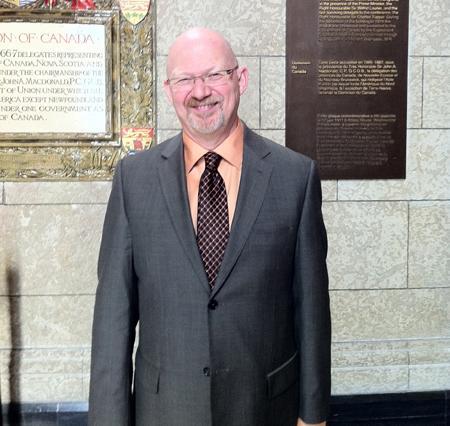At its mid-June policy convention in Vancouver, the NDP voted unanimously to call on the Canada Revenue Agency to revoke the charitable status of Exodus Global Alliance and to investigate other so-called ex-gay organizations.
“These organizations prey on vulnerable members of our community, often young people in difficult family situations at grips with self-hatred and depression,” says Randall Garrison, the party’s queer issues critic. “They bully them into believing that gay, lesbian and bisexual people are sick and lead sad and lonely lives, and that the only hope is to become straight. The federal government must not support this kind of unscientific falsehood.”
Garrison says a second resolution on blood transfusions was referred to federal council, like all other resolutions that didn’t reach the floor. As a BC MP, Garrison says he was pleased to host NDP MPs and delegates from elsewhere around the country.
“We were joking that all the Quebeckers get to find out what jet lag is all about,” Garrison says.
The convention also saw the election of new co-chairs to the party’s GLBTT Commission – Riccardo Filippone and Carolyn Greve. Outgoing co-chair Matt McLauchlin will remain as the commission’s treasurer, and Garrison hopes that the other outgoing co-chair, Toronto trans activist Susan Gapka, will continue to sit on the executive in some capacity.
Filippone, an NDP staffer in Ottawa with a history of activism in social justice organizations, says he is excited because his role is not only as co-chair of the commission, but also as a member of the executive of the party’s federal council.
“I wanted to help work with our [queer] caucus members to raise certain issues and other issues that our membership might have, but I also wanted to be that voice at our executive of our federal council,” Filippone says. “I just thought it was a great opportunity.”
While he has no immediate agenda as co-chair, preferring to get feedback from the Commission’s membership for the next couple of months, he does plan to use his position in Ottawa to get more of what the MPs are doing in the House and in committees out to the membership in a timely manner, as well as to meet with the MPs on a more regular basis.
“In the past, things happened and things ended up moving very quickly, and you missed things because they’re simply not here, and if nobody tells you, there’s really no way to know,” Filippone says. “Just physically being here gives me a bit of an advantage in that regard, that I can more easily keep on top of whatever the MPs are working on and whatever things just randomly come up.”
“What I really want to do is step up the relationship between the position that I currently have and the membership in terms of communicating everything that’s happening in the House that’s relevant – even if it’s small.”
Garrison says that the expanded size of the party’s queer caucus in Parliament was reflected in the mood of the Commission’s meeting at the convention.
“There was quite a bit of excitement about the fact that rather than everything falling on a couple of people that we’ve got more people to do the work,” Garrison says. “Plus Libby Davies is a very prominent member of our caucus and has the health file, and so we’ll get attention at another level from her having that strong portfolio.”
One major controversy of the convention was the debate to replace the word “socialism” from the party constitution’s preamble with the term “social democratic.” Gay MP Philip Toone, who describes himself as one of the party’s “dyed-in-the-wool” socialists, participated in that debate, as well, and addressed the party’s “socialist caucus.”
“We’re a party that’s open to all kinds of debate, and I think it’s great that we’re having that debate,” Toone says. “Frankly, I think it’s more important what we stand for and what we do than what words we use to describe it.
“People understand that we’re a progressive party, and I think that gays and lesbians across the country chose us as the party that’s there to support them and defend their interests.”
Ultimately that resolution was referred back to federal council, which suits Toone just fine.
“We’re going to spend the next couple of years discussing amongst all the riding associations and all the committees and all of the interested players,” Toone says. “Come the next convention, we’re going to have a nice healthy debate, I’m sure.”


 Why you can trust Xtra
Why you can trust Xtra


